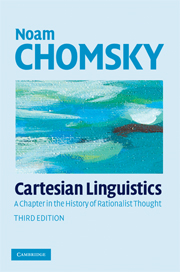Acquisition and use of language
Published online by Cambridge University Press: 25 January 2011
Summary
We have so far extracted from “Cartesian linguistics” certain characteristic and quite important doctrines regarding the nature of language and have, quite sketchily, traced their development during the period from Descartes to Humboldt. As a by-product of this study of langue, and against the background of rationalist theory of mind, certain views emerged as to how language is acquired and used. After a long interlude, these views are once again beginning to receive the attention that they deserve, although their appearance (like the reappearance of the central ideas of transformational grammar) was, in fact, a largely independent development.
The central doctrine of Cartesian linguistics is that the general features of grammatical structure are common to all languages and reflect certain fundamental properties of the mind. It is this assumption which led the philosophical grammarians to concentrate on “grammaire générale” rather than “grammaire particulière” and which expresses itself in Humboldt's belief that deep analysis will show a common “form of language” underlying national and individual variety. There are, then, certain language universals that set limits to the variety of human language. The study of the universal conditions that prescribe the form of any human language is “grammaire générale.” Such universal conditions are not learned; rather, they provide the organizing principles that make language learning possible, that must exist if data are to lead to knowledge.
- Type
- Chapter
- Information
- Cartesian LinguisticsA Chapter in the History of Rationalist Thought, pp. 98 - 106Publisher: Cambridge University PressPrint publication year: 2009



